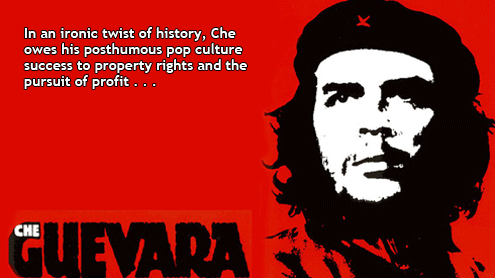 Property rights have often been at the centre of revolutionary demands, and have long been recognizable features of free governments around the world.
Property rights have often been at the centre of revolutionary demands, and have long been recognizable features of free governments around the world.Watching the coverage of protests and uprisings in the Middle East, I have yet to see anyone in the crowds waving an image of Che Guevara. I did say Guevara, instead of invoking more geographically-correct regional revolutionaries such as Abu Nidal or Yasser Arafat, both Palestinian heroes.
While many may not recognize the other two, most people recognize the iconic picture of Guevara, even though he has been dead for nearly 45 years. He was the charismatic Argentine revolutionary and famed sidekick to Fidel Castro. Following their 1959 Cuban victory, Guevara set out to export (surplus) revolution to other impoverished countries. After failing in Africa, he died trying to duplicate the Cuban experience in Bolivia. An image of him soon became an icon for revolution all over the world, even displayed by demonstrators during the 1979 Iranian Revolution.
In time, Guevara became a pop culture icon. He is the patron saint of social dropouts who wear his picture or try hard to affect his style. Among suburban youth, he became a symbol of countercultural rebellion against globalizing capitalism. But few remember the ruthlessness with which he condemned many bourgeois enemies and some of his own rebel friends to death.
By in an ironic twist of history, Guevara owes his posthumous pop culture success — which includes the publication of his memoirs in dozens of foreign languages, a truckload of biographies, an internationally recognized motion picture and a multi-part biographical film — to old fashioned property rights and the pursuit of profit. In death, Guevara has proven to be the unwitting, specialized, global capitalist commodity that would have made Adam Smith and Friedrich Hayek notice.
The Guevara commercial storm negotiated its way into the market following a lawsuit in London, England, in 2000. The plaintiff, one Alberto Korda, spiritedly opposed the use of Guevara’s image to promote Smirnoff’s Vodka in a British advertising campaign. Korda is the man who took Guevara’s iconic picture in Cuba in 1960, but had never exercised his rights to it. In the interim four decades, the picture now known as the Korda image was popularized by Italian photographer Giangiacomo Feltrinelli and was then posterized by IRA sympathizer Jim Kirkpatrick in 1967, the year Guevara died.
To express his contempt for the use of the Korda picture in an alcohol-selling, money-making venture, Korda had to claim rightful ownership of it in one of Her Majesty’s courtrooms, a painful act for any self-professed Marxist. Korda won the case, gave away most of the settlement money, and died in 2001.
By the 2004 release of The Motorcycle Diaries, a movie about the pre-revolutionary Guevara, the Korda image was ubiquitous. You could find it on hats, shorts, T-shirts and sweatshirts, bags, lighters and ashtrays, stationary, and even on women’s undergarments.
Irony of ironies, almost every silkscreened garment in North America with Guevara’s image was manufactured in Honduran sweat shops while imported and distributed by an American company aptly named Fashion Victim, owned by David McWilliams. The bizarre situation would make any good communist’s stomach turn.
Korda’s family sold the picture’s copyright to McWilliams in 2002 for five years. Bent on milking the privilege for what he could, McWilliams also launched a string of legal claims on other manufacturers who were exploiting Guevara’s picture, asserting his property rights.
How well countries uphold and protect the right to property is a fundamental indicator of economic well-being and democratic culture. In Alberta, perhaps more than in the rest of Canada, there is a strong property rights culture, but most Canadians would be sufficiently appalled by the absence of these rights in some countries, or by their abridgement in others.
Next week, the Property Rights Alliance will launch the fourth edition of the International Property Rights Index, cataloguing the state of physical and intellectual property protection in 125 countries around the world. As the Canadian partner in the Alliance, the Frontier Centre will launch the index in Lethbridge.
Cuba has more publicly displayed pictures of Guevara per square kilometre than any other country in the world, but Cuba is not covered in the index because the country does not supply the requisite data. Among its close allies, in Iran and the would-be revolutionary states of Bolivia, Ecuador, Nicaragua and Venezuela are found some of the world’s lowest scores in protecting property rights. The governments most sympathetic to Guevara today have poor economies and little to no property rights guarantees.
T-shirts with Che Guevara’s face worn on city streets, rather than the places where his face is officially displayed in buildings, is a better indicator for property rights protection.
 Property rights have often been at the centre of revolutionary demands, and have long been recognizable features of free governments around the world.
Property rights have often been at the centre of revolutionary demands, and have long been recognizable features of free governments around the world. Property rights have often been at the centre of revolutionary demands, and have long been recognizable features of free governments around the world.
Property rights have often been at the centre of revolutionary demands, and have long been recognizable features of free governments around the world.